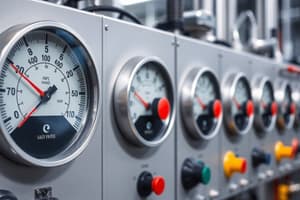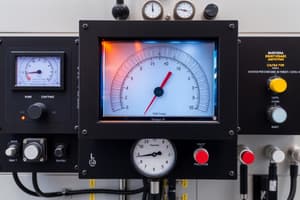Podcast
Questions and Answers
What is the primary function of sensors in instrumentation and automation?
What is the primary function of sensors in instrumentation and automation?
- Detect changes in physical parameters (correct)
- Convert electrical signals into physical phenomena
- Optimize industrial processes
- Generate mechanical stresses like vibrations
Which device is commonly used to measure high temperatures in industrial processes?
Which device is commonly used to measure high temperatures in industrial processes?
- Humidity sensors
- Thermocouples (correct)
- Pressure sensors
- Piezoelectric crystals
What do control systems in automation do based on feedback from sensors?
What do control systems in automation do based on feedback from sensors?
- Monitor and influence dynamic behavior (correct)
- Convert physical phenomena into electrical signals
- Generate electricity from mechanical stresses
- Optimize industrial processes
What is the purpose of process measurement in industrial processes?
What is the purpose of process measurement in industrial processes?
Which of the following is NOT an example of a control system application?
Which of the following is NOT an example of a control system application?
How do sensors contribute to technological advancements in industrial processes?
How do sensors contribute to technological advancements in industrial processes?
What is the purpose of key performance indicators (KPIs) for companies?
What is the purpose of key performance indicators (KPIs) for companies?
Which automation technique allows machines to operate independently without human intervention?
Which automation technique allows machines to operate independently without human intervention?
What is the function of programmable logic controllers (PLCs) in industrial processes?
What is the function of programmable logic controllers (PLCs) in industrial processes?
How do computerized numerical control (CNC) machines contribute to manufacturing operations?
How do computerized numerical control (CNC) machines contribute to manufacturing operations?
What role do instrumentation and automation play in industries?
What role do instrumentation and automation play in industries?
Flashcards are hidden until you start studying
Study Notes
Instrumentation and Automation
In instrumentation and automation, technological advancements have significantly transformed industrial processes by improving efficiency, accuracy, and safety. Both fields encompass various aspects of technology implementation, including sensors, control systems, process measurement, and automation control techniques. By understanding these concepts, businesses can optimize their operations and achieve higher levels of productivity. Here is a brief overview of intrumentsation and automation.
Sensors
Sensors are devices used to detect changes in physical parameters such as temperature, humidity, pressure, and flow rates. They convert physical phenomena into electrical signals that can be understood by other equipment. For instance, thermocouples are commonly used to measure high temperatures beyond the capabilities of other sensors, while piezoelectric crystals generate electricity when subjected to mechanical stresses like vibrations.
Control Systems
Control systems integrate hardware and software components to monitor and influence dynamic behavior based on feedback from sensors. These systems enable operators to maintain optimal conditions for their processes. Examples of control system applications include HVAC controls, traffic signal control units, and aircraft flight control systems.
Process Measurement
Process measurement involves gathering data continuously to determine the performance of various industrial processes. This information helps companies make informed decisions about their operations. Key performance indicators may include energy consumption, throughput, and product quality.
Automation Control Techniques
Automation control techniques allow machines to operate independently without human intervention. One example is robotics, which can perform repetitive tasks with precision and speed. Another category includes programmable logic controllers (PLCs), which control industrial processes using digital inputs and outputs. Additionally, computerized numerical control (CNC) machines facilitate precise manufacturing operations.
In conclusion, instrumentation and automation play crucial roles in enhancing operational efficiency across industries. Through innovative technologies like sensors, control systems, process measurement tools, and advanced machinery, businesses can streamline their workflows and increase production capacity while minimizing errors and associated costs.
Studying That Suits You
Use AI to generate personalized quizzes and flashcards to suit your learning preferences.



